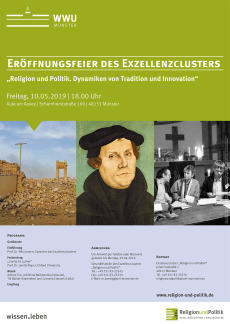New research programme “Dynamics of tradition and innovation”
Opening ceremony for new Cluster of Excellence funding phase – Guest lecture “Cranach’s Luther”

The Cluster of Excellence “Religion and Politics. Dynamics of Tradition and Innovation” at the University of Münster will open the new funding phase within the Excellence Strategy of the federal and state governments with a ceremony on 10 May, where the renowned Oxford University historian Prof Dr Lyndal Roper will deliver a keynote lecture on “Cranach’s Luther”. Lyndal Roper’s award-winning biography of Luther (whom Cranach painted many times) was published by S. Fischer in 2016 under the title Der Mensch Martin Luther (The Person Martin Luther). The opening ceremony will begin at 6 pm in the Aula am Aasee at Scharnhorststraße 100 in Münster. To register, please contact the Cluster of Excellence (m.koenig@uni-muenster.de) by 29 April.
The Speaker of the Cluster of Excellence, the legal scholar Nils Jansen, will introduce the Cluster’s new research programme at the beginning of the event, and Münster’s mayor Karin Reismann and University of Münster rector Prof Dr Johannes Wessels will then deliver a few words of greeting. Music will be provided by the Arthos Trio, comprising Nima Mirkhoshhal (piano), Till Müller (clarinet) and Cornelia Emmert (cello). Lyndal Roper, “Regius Professor of History” at Oxford, is an expert on the history of the Reformation and the Early Modern Period in Germany, and is a member of the Cluster of Excellence’s academic advisory board.
In the new funding phase of the Cluster of Excellence (2019 to 2025), which was approved in September 2018 as part of the Excellence Strategy, the 140 researchers from 20 disciplines in the humanities and social sciences will focus in particular on the “dynamics of tradition and innovation”. Epoch-spanning studies will analyze the factors that make religion the motor of political and social change. Particular attention will be paid to the paradox that religions often develop their innovative potential by drawing on their traditions. The research network is the largest of its kind in Germany and the only Cluster of Excellence in the country that deals with the issue of religion. The Cluster will be funded to the amount of 31 million euros from 2019 to 2025.
When religion accelerates or decelerates conflicts
“With the investigation of dynamics”, explains spokesperson Nils Jansen, “we will draw attention in the next funding phase to the active role of religion in the political and social conflicts of societies. In doing so, we will distance ourselves somewhat from secularization theories and other theories that, in explaining the social significance of religious communities, tend to treat religion as a traditional entity that only reacts to changes in its environment”. In Münster, on the other hand, researchers will investigate both how, even under conditions of declining religious and denominational affiliation, religion can initiate and influence socio-political change, and how religion itself changes in the process. “By dynamics of religion, we therefore mean its potential to strengthen and accelerate social processes and conflicts; or, conversely, to decelerate, divert and offset them”. (vvm/sca)

